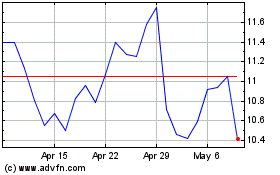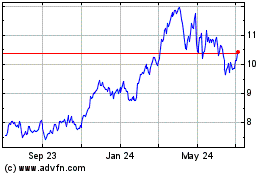PNC Deal Highlights Challenges of U.S. Market for European Banks -- 2nd Update
November 16 2020 - 3:46PM
Dow Jones News
By Patricia Kowsmann, Margot Patrick and Orla McCaffrey
Banco Bilbao Vizcaya Argentaria SA's sale of its U.S. operations
to PNC Financial Services Group Inc. underlines that for European
banks, America is a tough nut to crack.
The problem for BBVA was that while it grew in the U.S. over a
15-year period, particularly in the Southwest, it didn't get big
enough that it made sense to stay in the country. The
second-largest Spanish lender lacked the capital to further expand
its footprint and couldn't ask shareholders -- already struggling
with its depressed share price -- to put in more money.
Instead, BBVA signaled it will use the sale proceeds to increase
its presence at home and in other core markets to scale up and
boost profits. On Monday, following the U.S. sale announcement,
BBVA said it was in merger talks with domestic peer Banco de
Sabadell SA.
BBVA's strategic shake-up shows how the coronavirus pandemic is
forcing European banks to be more calculated about their prospects
for growth and survival. Another duo of Spanish lenders, CaixaBank
SA and Bankia SA, agreed to merge in September, and analysts and
regulators are betting more deals will come.
With the cash proceeds from the PNC deal -- equating to 50% of
BBVA's entire market value -- the bank could buy Sabadell and still
have money left to buy back shares to boost its share price and
satisfy shareholders. Sabadell's shares, which have been hit along
with other European banks', are down some 60% this year.
Shares of BBVA closed Monday up 15%. Sabadell's rose almost 25%
before BBVA made its announcement after the European market
close.
BBVA was among the European banking giants that spread out
across the world before the last financial crisis on a hunt for
growth. It bought a small California bank in 2004 and expanded
across Texas, Arizona and other Sun Belt states through a string of
acquisitions. It and larger Spanish rival Banco Santander SA kept
sizable retail banks in both North and South America, even after
other foreign banks exited in recent years.
But while BBVA was the No. 4 bank in Texas by deposits, its
market share, at 4.5%, was considered too small for strong
returns.
European banks already were struggling to make money under a
low-interest-rate environment and have been hard hit by the
pandemic. Spain's economy in particular has suffered as the spread
of the virus has triggered months of lockdowns. European banking
regulators' ban on dividend payments further hit the stocks. In the
U.S., banks big and small are warning that the economic pain is far
from over.
Pittsburgh-based PNC said it agreed to buy BBVA's U.S.
operations for $11.6 billion. In the U.S., shares of PNC were up 2%
in afternoon trading. Big bank takeovers have been rare since the
2008 crisis, with major players unwilling to test the political
waters and wary of new regulations now applied to larger banks.
Democratic administrations have typically been less friendly toward
megabank deals.
"The regulatory approval process is opaque at best," said Abbott
Cooper, a founder of Driver Management, a bank-focused
investment-management firm. "There are a lot of ways wrenches can
be thrown into the gears."
The merger that gave birth to Truist Financial Corp. last year
galvanized a wave of congressional hearings that helped push the
bank to postpone closing hundreds of branches.
Still, PNC is confident it will receive approval for BBVA, which
had been at "the top, or near top, of our wish list," PNC Chief
Executive Bill Demchak said on a call with investors Monday, in
part because the combined entity will be "one-fifth the size of the
giant four banks out there." The combined PNC-BBVA will have assets
of about $550 billion. JPMorgan Chase & Co., the largest bank
in the U.S., has more than $3 trillion.
Dick Bove, a banking analyst at Odeon Capital Group LLC, said in
a note to clients Monday "It is not altogether certain that this
deal will be certified." Still, he said PNC has "proven repeatedly
that it is capable of turning around failing franchises." That
includes its handling of National City Corp., a Cleveland-based
regional forced by regulators to accept a deal in the 2008
financial crisis.
BBVA continues to bet in markets where it sees itself as big
enough to succeed, including at home in Spain, and in Mexico and
Turkey. Its market share in lending in those countries is 13%, 23%
and 18%, respectively.
Other geographic retreats by European banks so far this year
have included HSBC Holdings PLC's shuttering of around one-third of
its U.S. branches, and ABN Amro Bank NV curtailing its lending to
corporate customers outside of Europe. Sabadell, BBVA's potential
acquisition target, has been considering ways to exit from the U.K.
after five years ago buying a midsize bank there that has struggled
for scale.
Write to Patricia Kowsmann at patricia.kowsmann@wsj.com, Margot
Patrick at margot.patrick@wsj.com and Orla McCaffrey at
orla.mccaffrey@wsj.com
(END) Dow Jones Newswires
November 16, 2020 15:31 ET (20:31 GMT)
Copyright (c) 2020 Dow Jones & Company, Inc.
BBVA Bilbao Vizcaya Arge... (NYSE:BBVA)
Historical Stock Chart
From Mar 2024 to Apr 2024

BBVA Bilbao Vizcaya Arge... (NYSE:BBVA)
Historical Stock Chart
From Apr 2023 to Apr 2024
